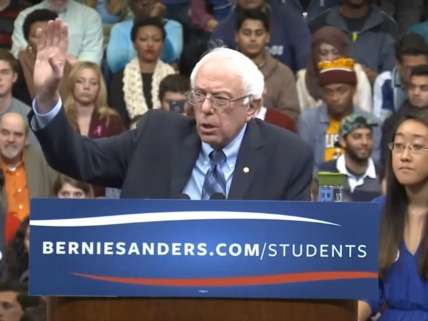Bernie Sanders Unveils Legislation to Repeal Pot Prohibition
The bill, the first of its kind in the Senate, would let states decide whether to ban or regulate marijuana.

Yesterday Bernie Sanders, the first major-party presidential candidate to endorse marijuana legalization, became the first U.S. senator to propose a bill repealing the federal ban on marijuana. Using language similar to the 21st Amendment, which repealed alcohol prohibition, the Ending Federal Marijuana Prohibition Act of 2015 says the Controlled Substances Act (CSA) "shall not apply to marihuana," except when people try to smuggle it into a state where it remains illegal. That offense would be punishable by a fine or up to a year in jail. The bill also removes "marihuana" and "tetrahydrocannabinols" from the CSA's list of controlled substances.
Sanders' bill is similar to the Regulate Marijuana Like Alcohol Act, which was introduced in the House last February by Rep. Jared Polis (D-Colo.). Rep. Dana Rohrabacher, a co-sponsor of that bill, takes a somewhat different approach in his Respect State Marijuana Laws Act, which he reintroduced in April. The latter bill simply states that the CSA shall "not apply to any person acting in compliance with State laws relating to the production, possession, distribution, dispensation, administration, or delivery of marihuana." Hence Rohrabacher's bill, unlike Sanders', leaves in place the current federal penalties for people who grow, possess, or distribute marijuana in states that have not legalized it.
Sanders, who has repeatedly decried the injustices inflicted by the war on marijuana, does not seem to have issued a statement in connection with his bill. I don't see anything about it on his Senate or campaign websites. But in a speech at George Mason University last week, the socialist senator from Vermont said "the time is long overdue for us to remove the federal prohibition on marijuana," because "states should have the right to regulate marijuana the same way that state and local laws now govern the sale of alcohol and tobacco."


Show Comments (91)